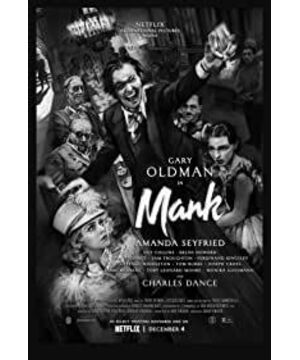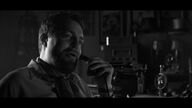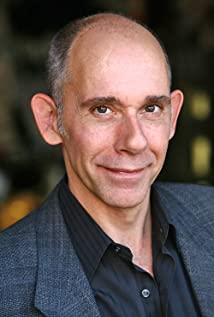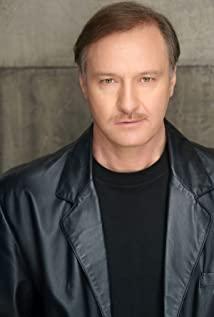After a whole year, the epidemic situation in Europe and the United States is still at its peak. In the face of reality, various production companies have finally realized that streaming media is the channel that allows films to reach the most audiences; the number of distributions on Netflix, Amazon and other platforms is also increasing. Until the last month of 2020, there really was a small outbreak, and we are most looking forward to David Fincher's new film "Mank".
David Fincher, who has not released a new work for nearly six years, has been busy either as a producer or filming TV series in recent years. Fortunately, David Fincher, who has entered 2020, has become prolific again. In addition to this latest "Mank," at least five films will be released in the next four years, all of which will be broadcast exclusively on Netflix.
With the high quality and high yield of David Fincher, it can be said that the "must-see list" of movie fans in the next few years is enough. Back to the film "Mank", due to the impact of the epidemic, the film has only recorded more than 80 million box office since it was released in the United States on November 13; but the freshness of Rotten Tomatoes has remained at 93%, which can be described as high. Word of mouth works.
Like Alfonso Cuaron's "Roma" and Quentin's "Once Upon a Time in Hollywood," the film "Mank" also has a carefully constructed "old-fashioned", even more old-fashioned form than the above two films. The film opens with a Hollywood-style opening in the 1930s and 1940s. As the subtitles roll, the panoramic black-and-white road shots, accompanied by the retro symphony, explain the time and place as soon as they come up, and then unfold the narrative. If it is not for high-definition pictures, it is estimated that many people will think that they are watching old Hollywood movies.
In fact, the title of the movie has already revealed the background of the story. "Mank" refers to the hero, Herman Mankiewicz, one of the screenwriters of the famous "Citizen Kane" and a golden screenwriter in Hollywood at the time. He has written scripts for 95 films in his life, and his works such as TV series and stage plays are even more numerous.
The story of the movie "Mank" comes from a script written many years ago by David Fincher's father, Jack Fincher. Since the 1970s, "who is the screenwriter of "Citizen Kane" has been controversial in the critics. If Jack Finch's script is the "original controversy" surrounding the "Citizen Kane" script, then David Fincher's work is based on this controversy, and the 1930s and 1940s that are drawn from it. The social profile of Hollywood.
Obviously, the significance of "Mank" is far more than "original controversy". Like Citizen Kane at the center of the controversy, it revolves around a plethora of characters from Hollywood's golden age, including writers, directors, media mogul, mistresses, actors, and more. If Mank had to be summed up in one sentence, it would be a movie about movies, Citizen Kane of Citizen Kane.
Of course, the difference is that the film "Citizen Kane" depicts the image of a "strong man" through the Kane in the mouths of the people, while "Mank" observes the image of everyone through the perspective and memories of one person. Kane is a man and a crowd. In other words, "Mank" is based on the proposition "how Citizen Kane was created" to show the glitzy era that has disappeared for seventy years.
Mank, who has written many successful scripts for a long time, was assigned to the talented young director Orson Welles to write the script for "Citizen Kane". In Hollywood, which is called "the golden age" by everyone, producers are important, actresses are important, and special-effects workers are important. Needless to say, the director, capital is simply king, and the media tycoon is even a god who points the world.
And only the screenwriter, "Who is he?" "Herman Mankiewicz, a famous screenwriter." "Who did you just say he was?" "Just as soon as the script was written." David Fincher said this The technique is both self-deprecating and a slap in the face of Hollywood celebrities who look down on screenwriting.
The film flashes back and forth between the creation of Citizen Kane in the 1940s and the Great Depression of the 1930s. State elections rely on black box operations and public opinion to build momentum, and movie casting depends on "someone covering it". The president of a country must be jointly decided by media tycoons and political leaders, which is no doubt as absurd as choosing a role. And those who have real insights are vilified and marginalized for ideological reasons. This is the thirties, and it is now.
In the film, David Fincher recreates the Hollywood Vanity Fair in the 1930s and 1940s with a lot of dialogues and scenes, which is also a cross-time and space intertext with Citizen Kane. The U.S. government that adopts an ostrich policy toward fascism, politicians who open their eyes to reality and talk nonsense, high-class ladies who only care about celebrities wearing fancy clothes, gentlemen who are accustomed to putting on airs, and flattering investors who hug their thighs. An actress who sees things in the world... Watching these characters and dialogues in "Mank" keep reappearing, I suddenly understand the existence of those scenes in "Citizen Kane".
The plot continues to feed back Citizen Kane in the intensification. From Manke and Hirst's dialogue, we can see more clearly the discussion of capitalism in American society, the balance of elections and power, and Manke's own cynicism. However, at the other end of existence is doomed.
Manke's boredom gave rise to a strange perspective to look at this bizarre world; it is precisely because of this that he was able to write such a special and bold script. The story of "Citizen Kane" seems to be a Hollywood-style "dream-making" at the time, but it can also be called an alternative work surrounded by "paralysis".
Although director Orson Welles himself rarely appears in the film, he is only "remotely" with his phone most of the time; but he is clearly the invisible pressure that is ubiquitous in the film. At the same time, the most important filmmakers of the era, Louis Mayer, the founder of MGM Studios, big producers Irving Solberg and David Selzwick, and even There are also Warner movies that are teased at any time. Fans who are familiar with David Fincher know that Fincher has no idle pen, and there must be a purpose where he writes.
The hero Mank lives in an environment full of these "sniffing" movie speculators. But people are in the rivers and lakes, and they have to serve these film capitals, balance between life and disgust, and desperately find their own foothold. The helplessness of the film is that Mank only dares to ridicule, dare not resist, and only shouts silently. Hollywood has created a brilliant legend, but at the same time cannot escape the cold reality.
Does he want to resist? He wants to resist! Can he resist? He can't resist! At the end of the film, through two different time and space Manke, step by step pushes up his resistance under the oppression. In 1937, at Hearst's extravagant banquet, Manke satirized and mocked a group of hypocritical plutocrats and high stars; in his view, spiritual filth was the real filth. In 1940, Manke asked Orson Welles for the script authorship, but it seemed to be more pure, showing his insistence on the script and his inner self.
At the end of the entire film, when Orson Welles and Manke shared the Oscar for Best Original Screenplay for Citizen Kane. In the interview, Manke said, half-jokingly, half-seriously, "If it were not for Orson Welles to write it, I would be very happy to accept this award."
In reality, Mank is obviously not so free and easy. After decades of struggle in Hollywood, nothing left in the end of film history; by comparison, Orson Welles has a promising future in his 20s. This calculation of gains and losses made Mank even more troubled. In a letter to his father, Manke wrote: "I am outraged at the words Orson Welles described how he created this masterpiece! In fact, he did not write a word before the camera started shooting. pass."
Of course, what is right and what is wrong in history has disappeared early. And why did director David Fincher choose to use the film to retrace this history? Is it the rebirth of a legendary movie? Is it to relive the glimmering Hollywood of the 1930s? Or just to show the irony of a down-and-out playwright? Probably in the eyes of different audiences, there will be different answers.
And the beauty of "Mank" in black and white in shades of light and shadow is a treat for all of us fans; not to mention those classic scenes that make people instantly return to the old Hollywood studio. In addition, there are white circles that appear from time to time in the upper right corner of the screen, which are intended to simulate the markings on the film in the era of film projection; although the film was shot in digital color, the post-production care also shows the sincerity of the work.
David Fincher, who has given up his brain for many years, seems to have created a story of a playwright who faces the cold reality, but from a certain point of view, the birth of "Mank" is not exactly David Fincher. A belated memorial to screenwriter Herman Mankiewicz?
At least, after 70 years, someone will remember him and use a movie to record his story. Therefore, more fans will sincerely agree, "Yes, "Citizen Kane" you created is indeed a masterpiece!"
Author | Peter Pan; Official Account | Watching Movies and Seeing Death
Editor | Teenager on the Roof; Please indicate the source for reprinting
View more about Mank reviews











